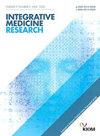探讨中药与针刺对失眠伴慢性疼痛的潜在跨诊断治疗效果:综述
IF 3
4区 医学
Q2 INTEGRATIVE & COMPLEMENTARY MEDICINE
引用次数: 0
摘要
背景:超过20%的成人失眠患者同时经历慢性疼痛,被称为失眠伴慢性疼痛(ICCP),增加了患身体和精神疾病的风险。目前的治疗方法,如认知行为疗法对失眠的缓解效果不一致,非阿片类镇痛药可能会加剧失眠,强调需要替代方法。中医指导下的中草药(CHM)和针灸可能为ICCP提供跨诊断益处,但缺乏全面的评价。本综述评估了它们对ICCP的治疗效果和机制。方法检索spubmed、万方、ClinicalTrials.gov和b谷歌Scholar,检索截至2024年12月31日的随机对照试验(rct),涉及成人(≥18岁),使用《精神障碍诊断与统计手册》第五版定义的失眠症和国际疼痛研究协会定义的慢性疼痛,接受中西医结合或针灸治疗。效应量(修正Cohen’s d)评估干预措施的疗效,Cochrane风险偏倚2工具评估偏倚风险。结果共纳入6项随机对照试验(rct),共487名受试者。桂皮汤对失眠(d = 0.70 ~ 1.17)和疼痛(d = 0.67 ~ 1.42)的治疗效果中~大。与常规治疗相比,针灸对失眠(d = 0.64-0.99)和疼痛(d = 0.80-1.33)有中等到较大的疗效。大活络胶囊联合针刺与多药联合牵引相比,疗效中等(失眠d = 0.72,疼痛d = 0.57)。大多数研究(83.33%)存在高偏倚风险。结论中西医结合针刺治疗ICCP有希望,但有较高的偏倚风险,需要谨慎解释和进一步的高质量随机对照试验。本文章由计算机程序翻译,如有差异,请以英文原文为准。
Exploring the potential transdiagnostic treatment effects of Chinese herbal medicine and acupuncture on insomnia disorder comorbid with chronic pain: A scoping review
Background
Over 20 % of adults with insomnia disorder also experience chronic pain, termed insomnia disorder comorbid with chronic pain (ICCP), increasing risks for physical and mental diseases. Current treatments like cognitive behavioral therapy for insomnia show inconsistent pain relief, and non-opioid analgesics may exacerbate insomnia, underscoring the need for alternative approaches. Chinese herbal medicine (CHM) and acupuncture, guided by traditional Chinese medicine, may offer transdiagnostic benefits for ICCP, but a comprehensive review is lacking. This scoping review evaluates their therapeutic effects and mechanisms for ICCP.
Methods
PubMed, Wanfang, ClinicalTrials.gov and Google Scholar were searched up to December 31, 2024, for randomized controlled trials (RCTs) involving adults (≥18 years) with Diagnostic and Statistical Manual of Mental Disorders, Fifth Edition-defined insomnia and the International Association for the Study of Pain-defined chronic pain, treated with CHM or acupuncture. Effect sizes (modified Cohen’s d) assessed efficacy of interventions, and the Cochrane Risk of Bias 2 tool evaluated the risk of bias.
Results
Six RCTs (487 participants) were included. CHM (modified Guipi decoction) showed medium to large effects for insomnia (d = 0.70–1.17) and pain (d = 0.67–1.42) versus diazepam/estazolam. Acupuncture had medium to large effects for insomnia (d = 0.64–0.99) and pain (d = 0.80–1.33) compared to treatment as usual. Combined CHM (Da Huoluo capsules) and acupuncture showed medium effects (d = 0.72 for insomnia; d = 0.57 for pain) versus multi-medications/traction. Most studies (83.33 %) had high risk of bias.
Conclusion
CHM and acupuncture show promise for ICCP management, but high risk of bias warrants cautious interpretation and further high-quality RCTs.
求助全文
通过发布文献求助,成功后即可免费获取论文全文。
去求助
来源期刊

Integrative Medicine Research
Medicine-Complementary and Alternative Medicine
CiteScore
6.50
自引率
2.90%
发文量
65
审稿时长
12 weeks
期刊介绍:
Integrative Medicine Research (IMR) is a quarterly, peer-reviewed journal focused on scientific research for integrative medicine including traditional medicine (emphasis on acupuncture and herbal medicine), complementary and alternative medicine, and systems medicine. The journal includes papers on basic research, clinical research, methodology, theory, computational analysis and modelling, topical reviews, medical history, education and policy based on physiology, pathology, diagnosis and the systems approach in the field of integrative medicine.
 求助内容:
求助内容: 应助结果提醒方式:
应助结果提醒方式:


